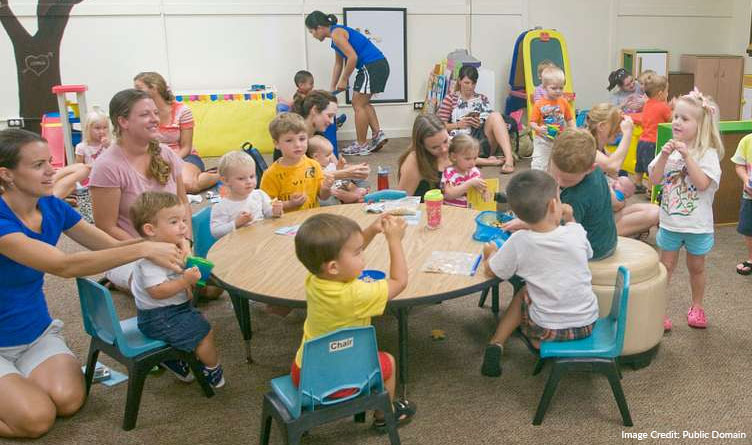Image Credit: Public Domain
The Center Square [By Jon Styf] –
A bill to redirect some of the taxes collected from sports betting in Tennessee to fund the state’s voluntary pre-K education program narrowly passed a Senate committee this week after its companion bill passed a House committee.
Senate Bill 2179 and House Bill 2201 were amended to redirect half of the money going to the Tennessee Promise endowment to pre-K programs. House sponsor Rep. Rebecca Alexander, R-Jonesborough, said the Tennessee Promise is expected to consistently have a $15 million annual surplus.
Tennessee Promise is a scholarship program for high school graduates looking to attain an associate’s degree. It is a last-dollar scholarship, meaning it will cover costs after other scholarships are factored in at community colleges, or it will fund up to the $4,000 average community college tuition mark for associate’s degree programs at four-year schools.
The bills would send an estimated more than $16 million to the state’s pre-K program annually instead of going to Tennessee Promise.
“There is a real need for pre-K across this state,” Alexander said. “We have pre-K in Kingsport City Schools right now, and it’s doing tremendous things to help our children learn and be on track.”
While there was not much opposition in the House K-12 Subcommittee, several members of the Senate Education Committee objected to the legislation based on long-term research done on Tennessee’s pre-K program.
A series of studies conducted by researchers at Vanderbilt University’s Peabody College showed results from the program were not clear. In some cases, students with similar attributes fared worse on sixth-grade testing than students who didn’t attend a pre-K program.
“A negative effect was also found for disciplinary infractions, attendance, and receipt of special education services, with null effects on retention,” the study said.
Lead author Dale Farran spoke with Chalkbeat Tennessee after the study was released and said the state’s pre-K program has changed since students were in it in 2009-10, but the results should be part of conversations on the future of the program.
“There are people pushing to make pre-K a grade below kindergarten,” Farran told Chalkbeat. “Our data show that’s not likely to have good results for children.”
Three senators – Sen. Mike Bell, R-Riceville; Sen. Jon Lundberg, R-Bristol; and Sen. Joey Hensley, R-Hohenwald – voted against the bill in committee, citing the Vanderbilt research.
“How many more studies do we need showing, questioning the effectiveness of our state’s voluntary pre-k program?” Bell asked. “… This isn’t a conservative anti-pre-K group doing these studies.
“This was the third or fourth report since the report started in 2010-11 and this was the most damning of the reports.”
*** Click Here to Support Conservative Journalism in Tennessee. We can’t bring you stories like this without your support!***
During House discussion, Rep. Scott Cepicky, R-Culleoka, pointed out a few issues with the study’s results, saying it was not clear whether the teaching in first through third grade is an issue that led to the negative sixth-grade results. He also said it was not clear whether pre-K has become more important because of learning losses during the COVID-19 pandemic.
“We continue to get conflicting information on pre-K,” Cepicky said. “I wish we could have a study done on recent numbers of students in the past couple years to see exactly how bad COVID has affected our children in Tennessee.”
Sponsoring Sen. Ferrell Haile, R-Gallatin, made clear this funding for the pre-K program is separate from the new proposed public school funding formula that will be going through the Legislature in coming weeks.
“It is tough for me intellectually to find out why because (the data) sounds wrong and all logic says this should work very well,” Lundberg said. “But we also have to look at data. And the data says it’s not working. And, in fact, it has regression, especially with minority populations. And that’s greatly concerning. … It’s not the dollars, it is truly the policy.”
Tennessee collects 20% of sports betting net operator revenue in taxes. Of the sports gambling taxes, 80% of the taxes collected goes to education, 15% goes to the state for distribution to local governments and 5% goes toward mental health programs.
The bills next head to the House Education Administration and Senate Finance, Ways and Means committees.


About the Author: Jon Styf, The Center Square Staff Reporter – Jon Styf is an award-winning editor and reporter who has worked in Illinois, Texas, Wisconsin, Florida and Michigan in local newsrooms over the past 20 years, working for Shaw Media, Hearst and several other companies. Follow Jon on Twitter @JonStyf.




One Response
Many children need a boost with pre k learning following Covid, a foundation in reading, writing, math and Classroom etiquette. They must be up to speed and have a baseline for learning readiness.
This should have an additional benefit of easing Day Care costs for working families and providing low cost nutritional meals for at risk children.